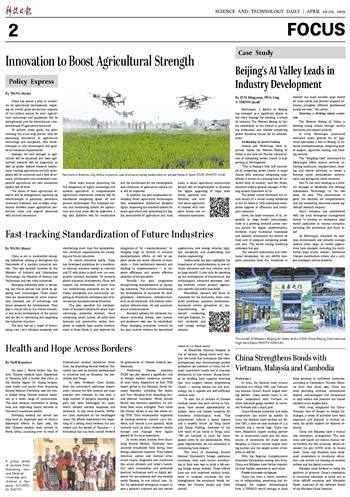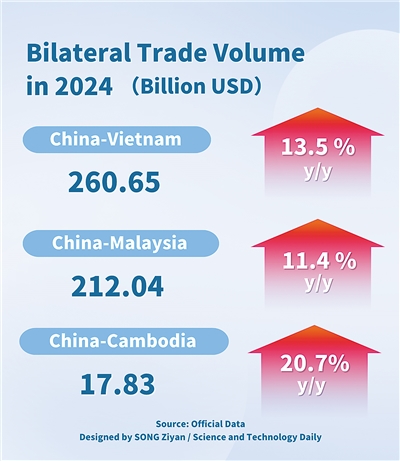
 |
Chinese President Xi Jinping paid a state visit to Vietnam, Malaysia and Cambodia from April 14 to 18, his first overseas trip of the year and of special significance for the overall development of China's relations with the three countries and ASEAN as a whole.
China and Vietnam, Malaysia and Cambodia have advanced their cooperation in green development, enhanced connectivity and ensured smooth trade. In the future, they will continue to work together closely under the framework of the Belt and Road Initiative to strengthen the bonds.
Green development
Recently, Power China has launched another renewable energy project in Vietnam. With a total installed capacity of 60 megawatts, it can deliver 165 gigawatt-hours of clean electricity to the Vietnamese national grid each year, meeting the needs of 48,000 local households and reducing about 132,000 tons of carbon emissions and other air pollutants.
Energy China, another Chinese energy giant, has signed a cooperation agreement with Vietnam Electricity to develop nuclear power and green hydrogen, as Vietnam places renewable and low-carbon technologies at the center of its long-term energy strategy.
China-Malaysia cooperation has achieved remarkable results in the field of new energy, including a 10 MW floating photovoltaic (PV) project in Selangor, and a 50 MW floating solar PV farm in Sarawak. Chinese companies such as Trina Solar and Jinko Solar have helped develop the local PV industry chain. Chinese new energy vehicle charging equipment manufacturers and operators such as TELD have built infrastructure networks with local partners.
Emerging fields such as green energy, electric vehicles and digital technologies provide new impetus for the expansion of cooperation between the two sides. These collaborations will help Malaysia achieve high-quality development, said Dato' Abdul Majid Ahmad Khan, president of the Malaysia-China Friendship Association.
In Cambodia, Chinese-invested mega-infrastructure projects such as the Phnom Penh-Sihanoukville Expressway and the Siem Reap-Angkor International Airport have laid a solid foundation for the development of domestic economy and tourism.
Trade facilitation
China is Vietnam's largest trading partner, largest import market and second largest export market.
In 2024, the bilateral trade volume exceeded 200 billion USD, and Vietnam has become China's fourth largest trading partner. China stands ready to advance cooperation with Vietnam on three standard-gauge railways in northern Vietnam and a smart port.
China-Malaysia economic and trade cooperation has scaled up rapidly. In 2024, the bilateral trade reached 212 billion USD, a year-on-year increase of 11.4 percent and a record high. China has been Malaysia's largest trading partner for 16 consecutive years and the main source of investment for many years. Malaysia is China's second largest trading partner and the largest source of imports in ASEAN.
With the Regional Comprehensive Economic Partnership coming into force, China and Malaysia have further expanded their market openness to each other.
People-to-people exchanges
China has been a major contributor to safeguarding, preserving and developing the Angkor Archaeological Park, a UNESCO world heritage in Siem Reap province in northwest Cambodia, according to Cambodia's Tourism Minister Huot Hak. Since 1997, China has been providing scholars, architectural experts, archaeologists and technicians to help restore and preserve the ruined temples in the Angkor park.
With 2025 designated the China-Vietnam Year of People-to-People Exchanges, a series of activities have been organized and planned to further cement the public support for bilateral relations.
China and Malaysia have a mutual visa exemption arrangement. The year 2024 saw nearly six million mutual visits between the two countries, which exceeded the pre-COVID level. In recent years, China and Malaysia have deepened cooperation in vocational education, and carried out training on modern railway and the digital economy.
Malaysia looks forward to using the platform to promote China's experience in vocational education at home and in other ASEAN countries, said Manndzri Nasib, chairman of the Advisory Board of the Malaysia-China Institute.


 Next
Next




